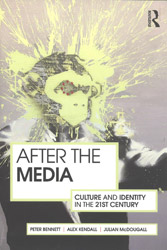After The Media – Culture and Identity in the 21st Century
Steve Hanson, Bradford College of Art
Bennett, P., Kendall, A. and McDougall, J. (2011), Routledge. .......... This book will be useful for teachers of media and cultural studies courses from secondary school level upwards, but also to postgraduate media students and engaged undergraduates, Level 6 particularly. But it is important to point out straight away that this is not a textbook simply collecting together and re-presenting i...

Authors:Peter Bennett, Alex Kendall and Julian McDougall
Publisher: Routledge
Publication date: 2011
ISBN: 978-0-415-58683-2
Price: £27.99
This book will be useful for teachers of media and cultural studies courses from secondary school level upwards, but also to postgraduate media students and engaged undergraduates, Level 6 particularly. But it is important to point out straight away that this is not a textbook simply collecting together and re-presenting its subject for a particular academic level either. The three authors of this outstanding book are trying to refigure cultural studies - a subject now inextricable from the media - into a future-oriented form.
The openness of this book is incredibly refreshing. The authors have cut challenging paths into relatively wild territory and I sincerely believe that their risks pay off. They talk of suspending ‘the political project’, the grand narrative ambitions of perhaps ‘lefty’ media lecturers, in favour of their notion of 'in-expertise'. Working in art colleges, I have seen again and again how media students - sometimes on their own, sometimes pushed strategically in particular ways - will go right to the ultima thule of any piece of software or kit, ignoring supposedly key functions, while inverting the accepted use of other aspects. The authors are arguing here for those edgy processes to be mined further for media education. They are asking that the politic come from the initially 'in-expert': from the students themselves. As a context for this, they identify a kind of academic elite, practising 'criticality', next to:
...digital creativity for employment in a non-sector in which (such as it can be pinned down) the qualifications we provide afford those who hold them with little, if any capital.
Clearly, these much wider educational questions have moved to the fore with the recent debate on youth unemployment, made starkly urgent by the rioting in England. The authors’ project is thrilling. It is encouraging, emancipatory, almost anarchist and challenging at every turn. One very big sacred cow it goes after is the dominance of the Birmingham Centre for Contemporary Cultural Studies’ theoretical influence in the subject. This is in some ways ironic, as the CCCS attempted to reveal hegemony in political and popular culture, but in other ways After the Media’s call for a little patricide perhaps simply repeats the oedipal moment of the CCCS’s formation. The authors of this book are keen to endow their audiences and producers - those who people media landscapes - with agency. They are not table-thumping Althusserians then, and in one memorable moment argue that Althusser ought to be ‘chaperoned’ at all times, without suggesting who might have the patience for that unenviable, impossible task. Yet this dropping of the 'political' by the authors is no shoulder-shrug either. Julian McDougall's 'Manifesto for Media Education' describes the book under review here, arguing that its thesis:
...was that our "subject" is always political in the sense that we are always-already concerned with discourse and "claims to truth" competing with one another in our engagement with media...
He goes on to argue that new media means new learning, a crucial point to make for the purposes of this publication. All three authors are attempting no less a task than the re-assessment of how we think within media landscapes. They are unafraid to hit the criticisms of media education from outside head-on, with honesty and pragmatism.
They then proceed to challenge the idea of ‘the media’ as one reified and tangible ‘thing’ and suggest 'Media 2.0' - a radically re-figured media and cultural studies - to coincide with the rise of web 2.0. They argue in successive chapters that 'genre', 'narrative', 'representation', 'audience' and 'ideology' are still relevant categories, but need to be considered 'post-media', and one of the main thrusts of that concept involves the audience being inextricably tangled up with, and feeding back into, all levels of those previously quite stable paradigms. Audience and producer have virtually collapsed into each other with the rise of citizen media and citizen remixes, and we can already see that in the future we will not wait for the director’s cut, we will instead make our own. There are serious ramifications to this. The authors see ‘genre’ as an increasingly problematic category via which we might think through our contemporary media world. We have already seen, and indeed many tired cultural studies departments still exclusively teach, the shift from 'work' to 'text'. It is still important to communicate this as a key part of the history of representation, only adding that the authors of this book are moving us from 'text' to 'event'.
And they have fellow travellers. Jodi Dean's recent book Blog Theory (Polity, 2010) does similar things with the author/audience, surveillance/surveyed dialectic. Her concept ‘circuits of drive’ seemed to hover above many passages in After The Media. It would have been good to see her text in here, but the publication dates of both books are too close. Still, I think there are other potential travellers who have genuinely been missed. If I have a gripe it is the lack of Friedrich Kittler in the bibliography. His Discourse Networks (Stanford University Press, 1992) also seems to me an ally. For Kittler discourse is at play in any form of media, rather than specific bundles of texts, technology or history, and again we need to look at the organizing principles behind this. But this gripe is more an indication of the personal taste of the reviewer, rather than any significant lack in the resource under review.
In conclusion then, this is a very significant contribution to the way we think through media issues theoretically, and - again crucially for our purposes - the way we approach pedagogy ‘after the media’, for our students, who are after all the future of its discourses.
Reviewer
Steve Hanson is a Cultural Studies Lecturer at various institutions, including Bradford College of Art.
References
McDougall, J. (2011) ‘Media education after the media’ A Manifesto For Media Education at http://www.manifestoformediaeducation.co.uk/2011/01/media-education-should-be-4/ Date accessed 07/09/11.


